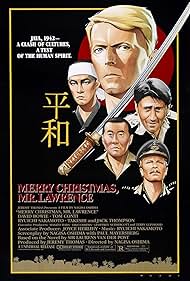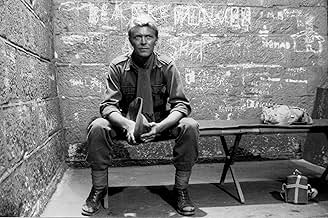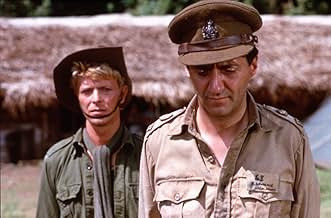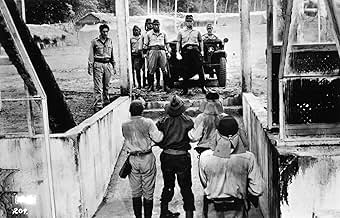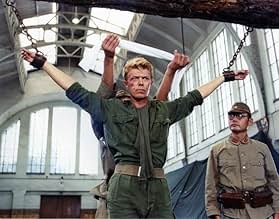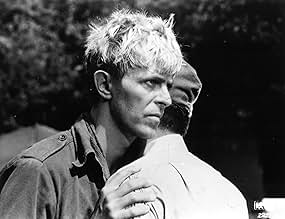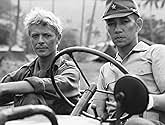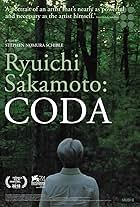IMDb RATING
7.2/10
21K
YOUR RATING
During WWII, a British colonel tries to bridge the cultural divides between a British POW and the Japanese camp commander in order to avoid bloodshed.During WWII, a British colonel tries to bridge the cultural divides between a British POW and the Japanese camp commander in order to avoid bloodshed.During WWII, a British colonel tries to bridge the cultural divides between a British POW and the Japanese camp commander in order to avoid bloodshed.
- Director
- Writers
- Stars
- Won 1 BAFTA Award
- 10 wins & 8 nominations total
Takeshi Kitano
- Hara
- (as Takeshi)
Johnny Ôkura
- Kanemoto
- (as Johnny Ohkura)
Yûya Uchida
- Commandant of Military Prison
- (as Yuya Uchida)
Ryûnosuke Kaneda
- President of the Court
- (as Ryunosuke Kaneda)
Takashi Naitô
- Lieutenant Iwata
- (as Takashi Naito)
Rokkô Toura
- Interpreter
- (as Rokko Toura)
Yûji Honma
- PFC Yajima
- (as Yuji Honma)
- Director
- Writers
- All cast & crew
- Production, box office & more at IMDbPro
Featured reviews
David Bowie appears on the cover of this film, in spite of having one of the smaller major roles. After you see the movie you no longer question his presence there. His performance is magnificent. Watch for the understated behaviour regarding the flower.
This film is memorable because of a tremendous cast (including Jack Thompson- who keeps popping up in war movies) and a wonderful soundtrack by Ryuichi Sakamoto, who also performs in the movie. The soundtrack captures the jungle feeling, coupled with Japanese moods. Forbidden colours (song) has been known to give me goosebumps.
Very much, not your average War movie, _Merry Christmas Mister Lawrence_ is excellent because it portrays the relationship between captor and captive, victor and defeated. It's a movie about human spirit and love under dangerous circumstances! It's a movie about discipline and honour, especially the different way these are perceived.
This film is memorable because of a tremendous cast (including Jack Thompson- who keeps popping up in war movies) and a wonderful soundtrack by Ryuichi Sakamoto, who also performs in the movie. The soundtrack captures the jungle feeling, coupled with Japanese moods. Forbidden colours (song) has been known to give me goosebumps.
Very much, not your average War movie, _Merry Christmas Mister Lawrence_ is excellent because it portrays the relationship between captor and captive, victor and defeated. It's a movie about human spirit and love under dangerous circumstances! It's a movie about discipline and honour, especially the different way these are perceived.
Do not mistake this masterpiece for a Capra Christmas movie. It is a war film without action (but with atrocities) that opens your eyes and is incredibly versatile and therefore applicable to any war that knows a winner and a loser.
The story is completely about perspectives and motives: power-madness and despair. Some might find MCML hard to stomach while watching, some afterwards. But I say you have to watch it through to appreciate the concepts fully. Moreover, I say you shouldn't vote it before you've seen all of it; that way the rating wouldn't be as low as 6.9. MCML is one of those films that surpass movies like 'Platoon' (Stone, 1986) on any level. Added to all that, it's also beautifully shot by cinematographer Toichiro Naroshima (Double Suicide).
One of the best scores in history of cinema by Ryuichi Sakamoto (also 'Wild Palms' and 'Sheltering Sky'), who not only provides it with his strokes of musical genius, but also plays an important role: the androgynous and curious captain in contrast to the virility of Takeshi Kitano (dir and acted Violent Cop, Brother, Hana Bi) the self-confident and straight-forward sergeant. If you've seen any of Kitano's movies, his character in MCML will gain from that. I guess director Nagisa Oshima (Naked Youth, Gohatto) likes to play with feminine and masculine characters. David Bowie fits in brilliantly from that perspective. His character is the most complex and worked out the deepest. My opinion is that this is his best and most intriguing role so far ('the Man who fell to earth' came close). Conti ('If we'll do it, he'll do it') plays a key figure between the Japanese and the POW.
On which side to lose a war? When to intimidate and when to be intimidated?
Which side are you on anyway? 'There are times victory is very hard to take' - Colonel John Lawrence. Not without reason sergeant Gengo Hara says 'Merry Christmas Mr. Lawrence' not: 'Merry Christmas Colonel Lawrence'. Are you intimidated by an initiation? Or still not when you're POW and the only free part of your body is your head? These are questions the film raises. Unfortunately I can't compare the film to the book, because I haven't read it. MCML is immensely powerful, and really underrated. 10/10
The story is completely about perspectives and motives: power-madness and despair. Some might find MCML hard to stomach while watching, some afterwards. But I say you have to watch it through to appreciate the concepts fully. Moreover, I say you shouldn't vote it before you've seen all of it; that way the rating wouldn't be as low as 6.9. MCML is one of those films that surpass movies like 'Platoon' (Stone, 1986) on any level. Added to all that, it's also beautifully shot by cinematographer Toichiro Naroshima (Double Suicide).
One of the best scores in history of cinema by Ryuichi Sakamoto (also 'Wild Palms' and 'Sheltering Sky'), who not only provides it with his strokes of musical genius, but also plays an important role: the androgynous and curious captain in contrast to the virility of Takeshi Kitano (dir and acted Violent Cop, Brother, Hana Bi) the self-confident and straight-forward sergeant. If you've seen any of Kitano's movies, his character in MCML will gain from that. I guess director Nagisa Oshima (Naked Youth, Gohatto) likes to play with feminine and masculine characters. David Bowie fits in brilliantly from that perspective. His character is the most complex and worked out the deepest. My opinion is that this is his best and most intriguing role so far ('the Man who fell to earth' came close). Conti ('If we'll do it, he'll do it') plays a key figure between the Japanese and the POW.
On which side to lose a war? When to intimidate and when to be intimidated?
Which side are you on anyway? 'There are times victory is very hard to take' - Colonel John Lawrence. Not without reason sergeant Gengo Hara says 'Merry Christmas Mr. Lawrence' not: 'Merry Christmas Colonel Lawrence'. Are you intimidated by an initiation? Or still not when you're POW and the only free part of your body is your head? These are questions the film raises. Unfortunately I can't compare the film to the book, because I haven't read it. MCML is immensely powerful, and really underrated. 10/10
10Inakaguy
I remembered watching this movie when I was younger and it affecting me a lot. Well, I re-watched it recently and it has lost none of it's power.
The acting in the movie is adequate without ever being great (the notable exception being Tom Conti who is fantastic in his role as the misunderstood titular character).
However, the movie moves beyond the acting and once you are embroiled in the atmosphere and realism you become oblivious to any acting shortcomings.
The movie must be one of the most accurate depictions of human nature in a war. It has a diverse range of characters yet none of them becomes a caricature. It certainly doesn't sink into the good vs evil mindset that many war movies do.
The violence is graphic and shocking despite lacking the visceral realism of Spielberg's later war movies.
The ending of the movie still affects me, even after repeated viewings. I still have to a lump or two to stop from crying even now.
Overall, recommended for anyone with an interest in a non-stereotypical movie about war. Not for the faint of heart though.
The acting in the movie is adequate without ever being great (the notable exception being Tom Conti who is fantastic in his role as the misunderstood titular character).
However, the movie moves beyond the acting and once you are embroiled in the atmosphere and realism you become oblivious to any acting shortcomings.
The movie must be one of the most accurate depictions of human nature in a war. It has a diverse range of characters yet none of them becomes a caricature. It certainly doesn't sink into the good vs evil mindset that many war movies do.
The violence is graphic and shocking despite lacking the visceral realism of Spielberg's later war movies.
The ending of the movie still affects me, even after repeated viewings. I still have to a lump or two to stop from crying even now.
Overall, recommended for anyone with an interest in a non-stereotypical movie about war. Not for the faint of heart though.
I have to applaud and second the reviewer who gives this film 10/10 and who thinks the current 6.9 average must be a result of many people not watching to the end. I think it's the result of many viewers not appreciating the art, subtlety, and deeply UNnationalistic message. In a country rife with jingoism, the message that no one is "right" when waging war (and especially commiting atrocity)will not be especially popular. After living three years in Japan, I can understand how American (and indeed Western)independence and confidence can be perceived as(and even sometimes are)arrogance and ethonocentricity.
The movie looks at what it means to be human and afraid. It examines how shame and cowardice haunt most men of noble heart. It reveals our commonalities to be undeniably more powerful and real than our transitory differences. It shows how truly stupid man must be to perpetuate the horrors of warfare and to mar his soul by using power to hurt others.
It's a 10/10 in my book, but realistically speaking, if most people agreed, well, there wouldn't be any grist for this mill.
The movie looks at what it means to be human and afraid. It examines how shame and cowardice haunt most men of noble heart. It reveals our commonalities to be undeniably more powerful and real than our transitory differences. It shows how truly stupid man must be to perpetuate the horrors of warfare and to mar his soul by using power to hurt others.
It's a 10/10 in my book, but realistically speaking, if most people agreed, well, there wouldn't be any grist for this mill.
Merry Christmas Mr. Lawrence, is one of those typical gems that you don't see that often because they are almost or very often underrated. I use the phrase typical because it is very much like that to underrate a non-mainstream movie like this one.
The story sets in Indonesia in the second world war, and tells the tale of a couple of British soldiers out in a Japanese camp for prisoners of war.
It gives us insight between the raging camp of the British soldiers with their Japanses guards. It tells the tale of prisoner Mayor Jack Celliers, a rebellious and confronting individual. It tells the tale of Prisoner Kolonel John Lawrence, who tries to build bridges between the two cultures who collide ever so often. It tells the tale of prison camp leader Captain Yonoi, who makes an effort in running things smoothly with understanding for his prisoners, but who, by the arrival of Mayor Jack Celliers, is being pressured, and discovers a whole new side of emotional understanding. It tells the tale of ward Seargant Hara, who doesn't seem to want to understand the prisoners, and would rather execute them than have them here.
Those 4 main characters come to interact with each other in very interesting ways, and the whole story rises to a dramatic climax which leaves it's impact.
The first degree acting makes this one of the most important things to watch this movie. Both British music legend David Bowie (As Jack Celliers) as well as Japanese music sensation Ryuichi Sakamoto (as Captain Yonoi) both have the lead in this epic picture. For Bowie it isn't this first time he appears on the big screen (The man who fell to earth, The Hunger),but it can be said that this is the role for which he will be remembered. Debuting here, Ryuichi Sakamoto plays the arrogant, and piped down captain Yonoi, and he doesn't make a bad figure with this. Truth is both musicians play very good, but the best parts are for debuting (at the time) comedian Takeshi Kitano (Srgt. Hara Ginko, and stage actor Tom Conti (John Lawrence) who steal the show. Conti's uptight and friendly character gives a lot of sympathetic gestures from the audience, and Takeshi has both the laughs and cry's (Watch the final scene) at his hand, for playing such a funny bastard.
Nagisa Oshima's direction is strong, and he leaves room for artistic influence for both cast and crew. He knows what he wants too show, and doesn't make the mistake of being to dramatic, or being to soft, on crimes that his fellow country committed in 1945. He stays realistic which works as a pro for this film.
The cinematography is beautiful, as well as the set and surroundings, but mostly, it is the score, the music, written by Sakamoto which leaves the most impression. A big plus, on all fronts and a absolute classic in it's genre. A must have and must see.
The story sets in Indonesia in the second world war, and tells the tale of a couple of British soldiers out in a Japanese camp for prisoners of war.
It gives us insight between the raging camp of the British soldiers with their Japanses guards. It tells the tale of prisoner Mayor Jack Celliers, a rebellious and confronting individual. It tells the tale of Prisoner Kolonel John Lawrence, who tries to build bridges between the two cultures who collide ever so often. It tells the tale of prison camp leader Captain Yonoi, who makes an effort in running things smoothly with understanding for his prisoners, but who, by the arrival of Mayor Jack Celliers, is being pressured, and discovers a whole new side of emotional understanding. It tells the tale of ward Seargant Hara, who doesn't seem to want to understand the prisoners, and would rather execute them than have them here.
Those 4 main characters come to interact with each other in very interesting ways, and the whole story rises to a dramatic climax which leaves it's impact.
The first degree acting makes this one of the most important things to watch this movie. Both British music legend David Bowie (As Jack Celliers) as well as Japanese music sensation Ryuichi Sakamoto (as Captain Yonoi) both have the lead in this epic picture. For Bowie it isn't this first time he appears on the big screen (The man who fell to earth, The Hunger),but it can be said that this is the role for which he will be remembered. Debuting here, Ryuichi Sakamoto plays the arrogant, and piped down captain Yonoi, and he doesn't make a bad figure with this. Truth is both musicians play very good, but the best parts are for debuting (at the time) comedian Takeshi Kitano (Srgt. Hara Ginko, and stage actor Tom Conti (John Lawrence) who steal the show. Conti's uptight and friendly character gives a lot of sympathetic gestures from the audience, and Takeshi has both the laughs and cry's (Watch the final scene) at his hand, for playing such a funny bastard.
Nagisa Oshima's direction is strong, and he leaves room for artistic influence for both cast and crew. He knows what he wants too show, and doesn't make the mistake of being to dramatic, or being to soft, on crimes that his fellow country committed in 1945. He stays realistic which works as a pro for this film.
The cinematography is beautiful, as well as the set and surroundings, but mostly, it is the score, the music, written by Sakamoto which leaves the most impression. A big plus, on all fronts and a absolute classic in it's genre. A must have and must see.
Storyline
Did you know
- TriviaAccording to David Bowie, Nagisa Ôshima directed the Japanese actors with great detail. But when it came to the British actors, they were told to "do whatever it is you people do".
- GoofsIn the final scene in the prison cell, the cross belt of Lt Col Lawrence's Sam Browne is fitted back to front.
- Quotes
Col. John Lawrence: You are the victim of men who think they are right... Just as one day you and captain Yonoi believed absolutely that you were right. And the truth is of course that nobody is right...
- ConnectionsFeatured in David Sylvian & Ryuichi Sakamoto: Forbidden Colours (1983)
- SoundtracksRide, Ride, Ride (Celliers' Brother's Song)
Composed by Stephen McCurdy
- How long is Merry Christmas Mr. Lawrence?Powered by Alexa
Details
- Release date
- Countries of origin
- Languages
- Also known as
- Merry Christmas, Mr. Lawrence
- Filming locations
- Rarotonga, Cook Islands(prisoners camp in Java)
- Production companies
- See more company credits at IMDbPro
Box office
- Gross US & Canada
- $2,306,560
- Opening weekend US & Canada
- $99,221
- Aug 28, 1983
- Gross worldwide
- $2,376,612
- Runtime2 hours 3 minutes
- Color
- Sound mix
- Aspect ratio
- 1.85 : 1
Contribute to this page
Suggest an edit or add missing content

Top Gap
By what name was Merry Christmas Mr. Lawrence (1983) officially released in India in English?
Answer